2017
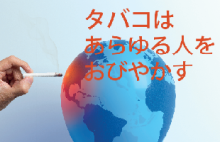
Tobacco – a threat to development
It is not only governments who can step up tobacco control efforts: people can contribute on an individual level to making a sustainable, tobacco-free world. People can commit to never take up tobacco products. Those who do use tobacco can quit the habit, or seek help in doing so, which will in turn protect their health as well as people exposed to second-hand smoke, including children, other family members and friends.
You can download the poster in Japanese from the link below.
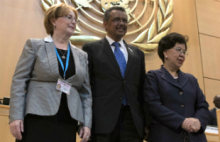
Dr Tedros Adhanom Ghebreyesus elected WHO Director-General
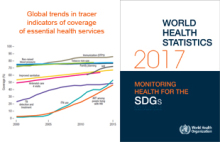
Japan has the highest life expectancy - the World Health Statistics 2017 report
This average, however, reveals clear gender differences with 6 years difference in life expectancy at birth between women and men. Women in Japan enjoy 86.8 years life expectancy at birth, putting them at the first rank among all WHO member states. Japanese men in the other end, with an average life expectancy of 80.5 years at par with men in Italy, lag behind Switzerland (81.3 years), Iceland (81.2 years), Australia (80.9 years), Sweden (80.7 years) and Israel (80.6 years).
More information can be found in The World Health Statistics, one of WHO’s annual flagship publications, that compiles data from the organization’s 194 Member States on 21 health-related SDG targets, and provides a snapshot of both gains and threats to the health of the world’s people.
World Health Statistics 2017: Monitoring health for the SDGs
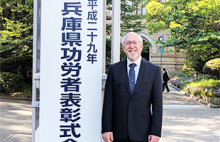
Special Hyogo Prefecture Award Given to Former WKC Director Alex Ross
This is the first time a WKC official has received this award. Mr Ross said “I am deeply honoured and thankful to Governor Ido and Hyogo Prefecture for this Award, and their longstanding support of the WHO Kobe Centre. I accept it recognizing the efforts and dedication of all of the Centre’s staff to advance global health and to translate lessons for and from Hyogo Prefecture to the world.” Hyogo and Kobe are global leaders in innovations for supporting older populations, sustainable health systems and emergency preparedness.
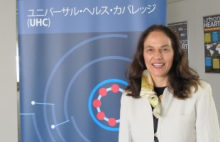
Dr Sarah Louise Barber appointed as new Director for the WHO Kobe Centre
Dr Barber is a distinguished health economist and policy specialist. Before becoming Director of the WHO Kobe Centre, she worked on strategic policy issues with the WHO including as Senior Health Policy Advisor in the Office of the Regional Director for Africa, WHO Representative to South Africa, Team Leader for Health Systems Development in China, and as Health Policy Advisor in Indonesia and Cambodia. In South Africa, China, Indonesia, and Mexico, Dr Barber developed programs of technical cooperation and research to advance reforms to achieve universal health coverage. Over the past 25 years, she has published widely on diverse topics in health economics and policy analysis. Dr Barber holds doctorate and post-doctorate qualifications from the University of California, Berkeley, USA, focusing on economic evaluation.
"I am honored to have the opportunity to lead the WHO Kobe Centre. We will strive to conduct high quality research that supports countries in transforming their health systems to address emerging challenges, and respond to the needs of older people,” said Dr Barber. “WKC has a unique role in WHO in developing innovative solutions to emerging health trends. It also plays a key role in sharing lessons learned from Kobe, Hyogo and Japan to other countries facing similar challenges.”

Depression: Let’s talk
World Health Day, celebrated on 7 April every year to mark the anniversary of the founding of the World Health Organization, provides us with a unique opportunity to mobilize action around a specific health topic of concern to people all over the world. The theme of our 2017 World Health Day campaign is depression.
Depression affects people of all ages, from all walks of life, in all countries. It causes mental anguish and impacts on people’s ability to carry out even the simplest everyday tasks, with sometimes devastating consequences for relationships with family and friends and the ability to earn a living. At worst, depression can lead to suicide, now the second leading cause of death among 15-29-year olds.
Yet, depression can be prevented and treated. A better understanding of what depression is, and how it can be prevented and treated, will help reduce the stigma associated with the condition, and lead to more people seeking help.
What is depression?
Depression is an illness characterized by persistent sadness and a loss of interest in activities that you normally enjoy, accompanied by an inability to carry out daily activities, for at least two weeks. In addition, people with depression normally have several of the following symptoms: a loss of energy; a change in appetite; sleeping more or less; anxiety; reduced concentration; indecisiveness; restlessness; feelings of worthlessness, guilt, or hopelessness; and thoughts of self-harm or suicide.
The slogan
The campaign slogan is: Depression: Let’s talk.
Who we are targeting
Depression can affect anyone. So this campaign is for everyone, whatever your age, sex, or social status. At the World Health Organization, we have chosen to pay particular attention to three groups that are disproportionally affected: adolescents and young adults, women of childbearing age (particularly following childbirth), and older adults (over 60s). Materials targeting these audiences are available in the campaign materials.
Overarching messages
- Depression is a common mental disorder that affects people of all ages, from all walks of life, in all countries.
- The risk of becoming depressed is increased by poverty, unemployment, life events such as the death of a loved one or a relationship break-up, physical illness and problems caused by alcohol and drug use.
- Depression causes mental anguish and can impact on people’s ability to carry out even the simplest everyday tasks, with sometimes devastating consequences for relationships with family and friends.
- Untreated depression can prevent people from working and participating in family and community life.
- At worst, depression can lead to suicide.
- Depression can be effectively prevented and treated. Treatment usually involves either a talking therapy or antidepressant medication or a combination of these.
- Overcoming the stigma often associated with depression will lead to more people getting help.
- Talking with people you trust can be a first step towards recovery from depression.
Links to resources:
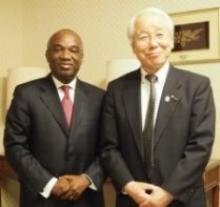
WHO Deputy Director General Visits Kobe, the WHO Kobe Centre, and Japan
On 6 April 2017, WHO Deputy Director General, Dr Asamoa-Baah, conducted his first official visit to Kobe, including to Governor Toshizo Ido, Hyogo Prefecture, to Vice Mayor Toshiro Tamada, Kobe City, and to the WHO Kobe Centre (WKC).
In all of his visits, Dr Asamaoa-Baah noted the unique contributions of the Centre within WHO and to the local and global community. Borrowing from the term "glocal," WKC has effectively translated research and practice lessons to and from Hyogo/Kobe to the rest of the world. WKC is a testbed for innovations, which are led by its multi-disciplinary and multi-national staff. WKC’s past and present work, particularly universal health coverage, innovation, ageing, and health emergencies, were recognized.
He recognized the excellent work of the WKC staff and their multi-disciplinary approaches to galvanize the contributions of many Japanese and international researchers. In this way, WKC is unique in WHO, along with its ability to collaborate with many parts of the Organization globally.
In his visits to Governor Ido and Vice-Mayor Tamada, Dr Asamoa-Baah thanked them, the citizens of Kobe, and the Kobe Group’s generous support to WKC since 1996.
During his meeting with Governor Ido, both he and Dr Asamoa-Baah recalled Governor Ido’s visit to WHO Headquarters in Geneva in 2007. Dr Asamoa-Baah noted his satisfaction that WKC has grown so much thanks to the support and cooperation of Hyogo Prefecture. He also praised Governor Ido for his leadership over the past 16 years and his many accomplishments ensuring the health and safety of Hyogo’s citizens.
In visits to both Vice-Mayor Tamada and Governor Ido, everyone agreed that WKC had significantly contributed to the G7 Health Ministers meeting last year by sharing common challenges we all face, such as rapidly ageing populations, dementia, and the need for measures against infectious diseases. Dr Asamoa-Baah noted that WKC represented "a success that we have seen rarely in recent years" and he was confident WKC would contribute in the future. Dr Asamoa-Baah further congratulated the Vice-Mayor and Governor on the world class biomedical research occurring at the Kobe Biomedical Innovation Cluster and the fact that Kobe has become a symbol of successful reconstruction after the Great Hanshin Earthquake.
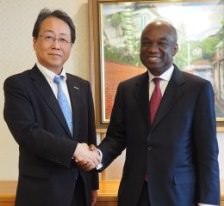
Dr Asamoa-Baah’s visit in Tokyo
On 31 March, Dr Asamoa-Baah delivered the closing remarks to the first WKC flagship UHC Leadership Development Capacity programme held in Yokohama City and Kanagawa Prefecture. The programme focused on health systems strengthening for ageing populations. Teams from Cambodia, Malaysia, Viet Nam, as well as Japan and Singapore participated.
On 3-4 April, the WHO Deputy Director General had the opportunity to visit the Healthcare New Frontier Initiative in Kanagawa Prefecture and to meet with Governor Kuroiwa and senior officials of the Prefecture.
Finally, on 7 April 2017, Dr Asamoa-Baah met with Minister of Health Yasuhisa Shiozaki, along with Dr Douglas Bettcher, Director, WHO Department for Prevention of Noncommunicable Diseases, where they discussed the need for a ban on smoking in all public places, including all indoor spaces, in Tokyo. They handed a letter from Dr Margaret Chan, WHO Director General, to Minister Shiozaki expressing the hope that Japan would implement the policy before the Tokyo 2020 Olympic and Paralympic Games.
Reference links
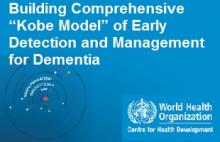
WHO/WKC Launches New Research Initiative for UHC and Ageing Populations: Lessons from Japan
Deadline for submission: Friday, 31 March 2017, 17:00 JST
Japan-based research institutions working in broad areas of health are invited to submit Proposals for implementation research projects that address one, or a combination, of the following specific issues in ensuring and sustaining Universal Health Coverage (UHC) for ageing populations in Japan, and that can contribute to other countries’ efforts:
- Community-based integrated care systems: How they are designed, rolled out and what implementation issues are being faced by large-scale health/social service delivery programmes at municipal, prefectural, regional, or national levels.
- Public health interventions on Non-Communicable Diseases (NCDs), including, however not limited to, cancers, cardio-vascular disease, chronic lung disease and oral health, with an emphasis on “age-friendly” interventions to prevent NCDs and/or manage multiple morbidities in ageing populations in specific settings, e.g., “healthy cities”.
- Health Workforce-related implementation issues: Assessing the need for, and competencies of, human resources for community-based care systems, care management systems, cultural notions of and community models for health/social care.
- Use of affordable technological innovations (i.e., assistive products, technologies, information/communication technologies), particularly to ensure older people can “age in place,” and how these technologies are integrated into home, community and health care settings.
- Development of novel approaches for risk assessment/public health preparedness for ageing populations and health emergencies (natural disasters, communicable disease outbreaks).
The research projects are expected to investigate and help to resolve implementation issues in public health and the design/delivery of health or social services for older populations enabling them to maintain their health status, functionality, wellbeing, and to remain at home or the community for as long as possible; and to highlight lessons to be learned from Japan, for other countries and their health systems. It excludes biomedical research.
Recognizing that the World Health Organization’s Centre for Health Development (WKC) is located in Kobe, Japan, Hyōgo Prefecture, and that WKC will provide technical assistance to the funded research entities, this Call is directed at the following research institutions (with the following priority):
- Universities or academic institutions in the Kansai region
- Japan-based research institutions working with public health programmes, health systems or populations in Kansai region, Hyogo Prefecture or Kobe municipality
- Universities in Japan working with other universities in the Kansai region
The lead institution is welcome to form a consortium with other Japan-based or international institutions. The research work is expected to lead to high-profile, UHC-relevant and internationally recognized research that will be published in high impact scientific journals and lead to effects in policy and public health practice.
This Call, issued by WKC is in support of the Centre’s mandate and 10-year strategy to support and strengthen research on Universal Health Coverage, with an emphasis on interventions for ageing populations.
Under this Call, a total amount of $500 000 will used to fund successful proposals, leading to research projects selected for one year’s funding not to exceed US$ 100 000 each.
Background and rationale
One of the key challenges to attain UHC is to strengthen health systems for ageing populations. Rapid population ageing is having profound implications for transforming and re-aligning health, social, and economic systems to improve health and wellbeing. Expanding and disseminating evidence is urgently required to improve decision making leading to more sustainable and inclusive policies and programmes for ageing populations. In this situation, WKC has launched its new ten-year research strategy on UHC, Innovation and Ageing, whereby the Centre will expand its collaboration on joint research with local, Japanese and international academia. Examples of long term issues to be considered include: policy and programme innovations; new community-based models of care and support; integrated and coordinated health and long term care systems; technological innovations; strengthening health systems (e.g. health workforce); and monitoring of age and dementia friendly initiatives. Many lessons from Japan can be adapted for other countries and their health systems: For example, how to address public health concerns of ageing societies and needs of ageing populations, the increasing prevalence of cognitive impairments/dementia, and efforts to increase health leadership and research capacity strengthening.
Proposal submission and protocol development
The proposal should outline the design, methodology and estimated budget (of up to USD 100,000) for a one-year implemented research project, to be carried out in 2017-2018 in collaboration with WKC, and in partnership with other research projects funded under the research scheme. Given the need for review/clearance of WHO Ethics Review Committee before the actual start of an accepted proposal (see below), the expected project start date should be no sooner than 1 August 2017 and the end date should be no later than one year after start date, 1 December 2018 at the latest.
Proposals should be submitted using the WHO Kobe Centre’s Proposal form (available on the WKC website . Short one-page CVs of Principal Investigators (PI) and proposed researchers, including letters from researchers of other institutions confirming their willingness to collaborate on the proposed activity, should be attached.
Research teams of proposals selected for funding will be invited to an initial protocol development workshop held at the WHO Kobe Centre from 22-23 May 2017. Teams will have one month from the workshop to submit the full research protocol. Submission of a proposal indicates general willingness and availability to participate at the workshop with two members of the research team having different but complementary disciplinary backgrounds. The full research protocol will need review and clearance from local/national Institutional Review Boards (IRBs) (if applicable), and the WHO Research Ethics Review Committee (ERC). Projects cannot be funded or initiated until both clearances have been obtained. While the time it will take to obtain the clearance will vary by project, WHO funding for the projects, and their actual start, are expected to be in the 3rd or 4th quarter of 2017.
Evaluation criteria
All incoming proposals will be evaluated by a peer review group external to WKC (convened by WKC). Such evaluation will be according to scientific merit and relevance to the Call, with special attention to the following features of the future research project:
- Multidisciplinary research team
- Involvement of key stakeholders (both at the national policy as well as the local policy implementation level, e.g. communities, municipalities, resident and welfare societies)
- Multi-sectoral interventions
- Social mobilization and community participation components
- Gender-sensitive approach
- Multi-scale / multi-level analysis (using quantitative, qualitative or mixed methods)
- Dissemination and utilization of research results
- Policy linkages based on research results
- Potential relevance for adaptation to other country contexts
- Appropriateness of budget and value for money
Scientific merit
- Appropriate problem statement and rationale
- Clear and well defined objectives
- Appropriate and feasible research questions
- Concise, pertinent, complete, appropriate literature review
- Sound analytic framework and feasible design, including intervention design
- Appropriate methodology
- Appropriate response to ethical issues and challenges
- Time plan
- Soundness
Relevance
- Appropriateness of the methodology to the problem and the context
- Plans to engage non researchers, those who have a stake in the research results
- Plans to engage non researchers, those who have a stake in the research results
- Potential to strengthen organizational capacity
- The extent to which the proposal has potential to influence policy
- The extent to which proposed project is likely to address societal problems
- The extent to which the proposed project can inform other countries and their policy development
- Dissemination plan
- Principal Investigator and research team members’ track record in research in relevant fields (e.g. publications, research grants, etc.)
- Existing capacity of institution and potential for increased capability
- Ability of the Principal Investigator to manage the project
- Team composition suitable to the tasks proposed
HOW TO APPLY
Proposals should be submitted in English, by e-mail (preferably as a pdf file, with scanned signatures) to wkc@who.int using the e-mail subject line, “2017 Proposal for Implementation Research”. All proposals will be reviewed by an independent AdHoc Review Group convened by WKC in April 2017. The selection of successful research teams will be announced in early May 2017. The protocol development workshop for selected teams will be held at the WHO Centre for Health Development in Kobe, Japan, 22-23 May 2017. Actual funding to selected projects will be provided once the research protocol has been cleared by the WHO Research Ethics Review Committee, to be expected in the 3rd or 4th quarter of 2017.
Disclaimers
WHO has the right to eliminate bids for technical or other reasons throughout the evaluation/selection process. WHO shall not in any way be obliged to reveal, or discuss with any bidder, how a proposal was assessed, or to provide any other information relating to the evaluation/selection process or to state the reasons for elimination to any bidder. WHO is acting in good faith by issuing this call for proposal. This document itself does not oblige WHO to fund any proposal or project.
DEADLINE FOR RECEIPT OF APPLICATIONS AT THE WHO Kobe Centre: Friday, 31 March 2017, 17:00 JST
For further details, please contact:
WHO Centre for Health Development (WHO Kobe Centre)
I.H.D. Centre Building 9F, 1-5-1 Wakinohama-Kaigandori,
Chuo-ku, Kobe 651-0073, Japan
TEL. +81 78 230 3100
FAX +81 78 230 3178
wkc@who.int
http://www.who.int/kobe_centre/
Related links
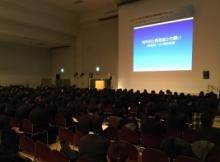
"What can we, high school students, do for the ageing world?" Kobe/Hyogo High School Forum: Youth Meeting the World
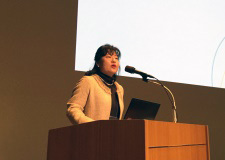
In the keynote speeches, Professor Junko Otani of Graduate School of Human Sciences, Osaka University talked about her experiences working in several international agencies in many different parts of the world, and her field work in disaster-struck areas such as the Great Hanshin Awaji Earthquake, the Great East Japan Earthquake to the Great Sichuan earthquake in 2008. As a message to the students, she emphasized the importance of studying foreign languages. “Not only English but some of the Asian languages will be a great asset; don't be introvert, be an extrovert.”
And Dr Ryoma Kayano, Technical Officer of the WHO Kobe Centre took the podium and explained about WHO and its history of fighting against communicable diseases and public health concerns in the 21st century, such as emerging communicable diseases, global population ageing and the double burden of communicable and non-communicable diseases. He also mentioned that “Challenge your limits and widen your horizon when you are young. A bright future is yours.”
Mr Shinjiro Nozaki, External Relations Officer of the WHO Kobe Centre then moderated a Panel Discussion with four high school students, under the theme of “Japan’s future, the ageing society”. Ms Miori Oshima of Hyogo Prefectural Amagasaki-Inazono High School mentioned “The definition of old people in Japan, 65 years old, should be changed and raised now reflecting healthy and active old age”. Mr Keisuke Kanda of Hyogo Prefectural Sumoto High School shared his idea of “Creating a new compact city in an open area in Awaji island with a public transportation network and facilities needed in everyday life, in order to produce more chances of communication and jobs for the older population.”
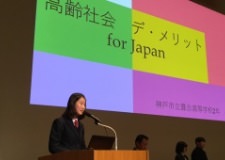
Ms Mai Tamura of Hyogo Prefectural Tatsuno Senior High School said “Japan should increase the chances of social connections and social participation among older persons and to be a role model to the world showing healthy and active ageing”. Ms Hana Kobayashi of Kobe Municipal Fukiai High School said “Old people contribute to society significantly economically and socially. Their experiences are important to the economy, they can take care of grandchildren whose parents are working, they play an important role in inheritance of tradition and safety and security in the community.”
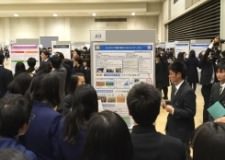
In the afternoon, lively discussions and presentations took place at the 30 booth exhibitions; at podiums where 13 short lectures on activities by globally active organizations, entities, and universities were delivered; and at 84 poster sessions where students presented their work.
To wrap up the day’s extensive programme, Dr Hisanobu Kakizawa, Associate Professor at Center for Education in Liberal Arts and Sciences of Osaka University, mentioned “There are multiple viable solutions for given questions, and you cannot find one correct answer in the textbook. Trial and error learning method is important.” He encouraged the students to pursue excellence in their future work and careers, and noting they will be the ones to discover new solutions.
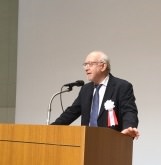
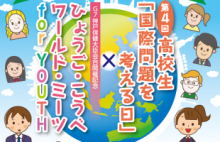
"Kobe/Hyogo Youth Meeting the World" - Commemorating the 2016 G7 Health Ministers’ Meeting held in Kobe
The WHO Kobe Centre and the G7 Kobe Health Ministers' Meeting Promotion Council are organizing a large meeting of Kobe and Hyogo Prefecture High School students exploring global health: “Kobe/Hyogo Youth Meeting the World” at the Kobe International Exhibition Hall on February 11, 2017. This event commemorates the 2016 G7 Health Ministers’ meeting held in Kobe.
During the full-day programme, about 500 high school students in Hyogo-Kobe will experience a wide variety of learning opportunities in order to be effective ambassadors and international citizens.
This important gathering continues opportunities for High School students to learn about global health and to become future leaders following from the first Hyogo-Kobe GLOBAL HEALTH High School Summit held in August 2016 organized by the WHO Kobe Centre and the G7 Kobe Health Ministers' Meeting Promotion Council. The Summit was one of the pre-events for the Kobe G7 Health Ministers’ Meeting where high school students discussed how they could contribute to global health and adapted the High School Summit Declaration.
Alex Ross, Director, WKC notes that the “WHO Kobe Centre is a unique global research centre that is leading development of policies and programmes for ageing populations and health systems to achieve universal health coverage. We are connecting the world to Kobe by bringing world class knowledge to Kobe, while disseminating lessons from Kobe to the world. We are delighted to contribute to the education and experience of young students in Hyogo in order for them to be international citizens”
“Kobe/Hyogo Youth Meeting the World”
- Commemorating the 2016 G7 Health Ministers’ Meeting in Kobe
Time: 11 February, 2017 09:30 - 17 : 00 (Opens 09 : 00)
Venue: Hall No.2 Building, Kobe International Exhibition Hall
(〒650-0046 6-11-1 Mintaojima-Nakamachi, Chuo-ku, Kobe 078-302-1020)
Organized by: G7 Kobe Health Ministers’ Meeting Promotion Council, WHO Kobe Centre
Cosponsored by: Hyogo Prefectural Board of Education, Osaka University
Supported by: Ministry of Health, Labour and Welfare, Ministry of Foreign Affairs of Japan, JICA Kansai, Kansai NGO Council, Japan Association for International Health, Kobe City Board of Education
Participants: Students living in Hyogo prefecture. Approx. 500 students (Registrations required)
Programme
9:30-9:40 Opening remarks
9:40-10:50 Keynote Speeches
“To be a leader in the international communities- my experiences as an international civil servant and as a researcher”
Junko Otani, Professor, Human Sciences, Graduate School of Human Sciences, Osaka University
“Public Health Concerns in the 21st century – double burden of communicable and non-communicable diseases”
Ryoma Kayano, Technical Officer, WHO Kobe Centre
10:50-11:50 Panel Discussion “Japan’s future, the ageing society”
Moderator: Shinjiro Nozaki, External Relations Officer, WHO Kobe Centre
Participants: 4 high school students from Hyogo Prefecture (Hyogo Prefectural Amagasaki-Inazono High School, Sumoto High Shool, Hyogo Prefectural Tatsuno Senior High School, Kobe Municipal Fukiai High School)
Discussion with the Audience.
11:50-14:30 30 Booth Exhibitions and 15 Short Lectures on activities by globally active organizations, entities, and universities:
(Governmental and International Agencies, Embassies and Consulates, NGO, Private Entities, Universities etc…)
14:30-16:40 100 Poster Sessions by high school students
16:40-16:55 Commentary
16:55 Closing remarks
Alex Ross, Director, WHO Kobe Centre


